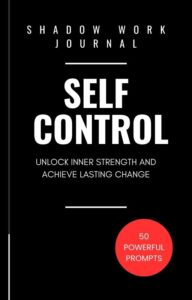Self-control is a vital skill that impacts many areas of our lives, from our relationships and work to our personal well-being and long-term goals. It involves the ability to regulate our emotions, thoughts, and behaviors in the face of temptations and impulses. Mastering self-control can help us make better decisions, achieve our objectives, and lead more fulfilling lives.
Shadow work is a powerful practice that involves exploring the hidden or less visible parts of ourselves, often referred to as the “shadow.” These are aspects of our personality and behavior that we might not be fully aware of or might try to avoid. By bringing these parts into the light, we can understand them better and work on improving them.
This collection of 50 shadow work prompts is designed to help you delve deep into your inner world, uncover hidden patterns, and build a strong foundation for self-control. The prompts will guide you through daily reflections, weekly reviews, and deeper explorations of your past experiences, emotions, and beliefs. By consistently engaging with these prompts, you can gain greater self-awareness, develop effective strategies for self-control, and make meaningful progress in your personal growth journey.
Understanding Self-Control: Mastering Your Inner Strength
What is Self-Control?
Self-control is the ability to regulate your emotions, thoughts, and behaviors in the face of temptations and impulses. It’s about having the discipline to resist short-term gratification in favor of long-term rewards. This essential skill allows you to make choices that align with your goals, values, and well-being, rather than being driven by immediate desires or external pressures.
The Importance of Self-Control
Self-control plays a crucial role in various aspects of life, including:
- Personal Relationships: It helps you manage conflicts, communicate effectively, and build trust.
- Work and Career: It enables you to stay focused, meet deadlines, and maintain professionalism.
- Health and Well-being: It supports healthy habits, such as regular exercise, balanced eating, and adequate sleep.
- Financial Stability: It encourages responsible spending, saving, and long-term financial planning.
Examples of Self-Control in Everyday Life
To better understand self-control, consider these common scenarios:
- Diet and Exercise: Imagine you’re trying to eat healthier. You pass by a bakery and the smell of fresh pastries is tempting. Self-control is the ability to resist the urge to buy a pastry and stick to your healthy eating plan.
- Work Deadlines: You have a project due at work, but you’re feeling tired and would rather watch TV. Self-control helps you prioritize your work and meet the deadline, even when distractions are appealing.
- Emotional Reactions: During an argument with a friend, you might feel the urge to say something hurtful in the heat of the moment. Self-control allows you to pause, take a deep breath, and respond calmly instead.
The Science Behind Self-Control
Self-control is often linked to the prefrontal cortex, the part of the brain responsible for decision-making, planning, and regulating behavior. When you exercise self-control, this area of the brain is highly active, helping you evaluate the consequences of your actions and choose the best course of action.
Strategies for Building Self-Control
Improving self-control takes practice and dedication. Here are some strategies to help you build this essential skill:
- Set Clear Goals: Define what you want to achieve and break it down into manageable steps.
- Practice Mindfulness: Mindfulness techniques, such as meditation and deep breathing, can help you stay present and make conscious choices.
- Develop Healthy Habits: Establish routines that support your goals, such as regular exercise, balanced eating, and adequate sleep.
- Avoid Temptations: Remove or minimize triggers that challenge your self-control. For example, keep unhealthy snacks out of the house if you’re trying to eat better.
- Use Positive Reinforcement: Reward yourself for making good choices to reinforce the behavior. This could be as simple as acknowledging your effort or treating yourself to something enjoyable.
The Benefits of Self-Control
Cultivating self-control can lead to numerous benefits, including:
- Improved Relationships: Better communication and conflict resolution skills lead to healthier, more fulfilling relationships.
- Increased Productivity: The ability to focus and manage time effectively boosts your work performance and achievements.
- Enhanced Well-being: Making healthier choices contributes to physical and mental well-being.
- Financial Security: Responsible spending and saving habits promote long-term financial stability and peace of mind.
Overcoming Challenges in Self-Control
Building self-control is not always easy, and it’s common to encounter challenges along the way. Here are some tips to help you overcome obstacles:
- Recognize Triggers: Identify situations, people, or emotions that challenge your self-control and develop strategies to manage them.
- Stay Motivated: Remind yourself of your long-term goals and the benefits of self-control.
- Seek Support: Share your goals with friends or family members who can provide encouragement and accountability.
- Learn from Setbacks: When you experience a lapse in self-control, reflect on what happened and how you can improve in the future. Use setbacks as learning opportunities rather than reasons to give up.
Self-control is a powerful tool that can transform your life by helping you make better decisions, achieve your goals, and improve your overall well-being. By understanding the concept, practicing effective strategies, and overcoming challenges, you can master the art of self-control and unlock your inner strength. Remember, self-control is a skill that can be developed with time and effort, leading to a more disciplined, balanced, and fulfilling life.

Embrace the Power of Shadow Work: Transforming Self-Control
What is Shadow Work?
Shadow work is a transformative practice that involves exploring the hidden or unconscious parts of yourself—often referred to as the “shadow.” These are aspects of your personality, emotions, and behaviors that you might not be fully aware of or may even try to suppress. By bringing these hidden elements into the light, you can gain deeper self-awareness, heal past wounds, and make positive changes in your life.
The Concept of the Shadow
The concept of the shadow comes from the work of Carl Jung, a Swiss psychiatrist and psychoanalyst. Jung believed that everyone has a shadow side, which consists of the parts of ourselves that we deem unacceptable or undesirable. These could include negative emotions like anger, jealousy, and fear, as well as positive qualities that we may have repressed due to societal or familial pressures.
Why Shadow Work Matters
Understanding and integrating your shadow is crucial for personal growth and self-control. When you ignore or deny your shadow, it can manifest in harmful ways, leading to self-sabotage, emotional outbursts, and destructive behavior. Shadow work helps you confront these hidden aspects, understand their origins, and transform them into sources of strength and wisdom.
How Shadow Work Enhances Self-Control
- Increases Self-Awareness: By engaging in shadow work, you become more aware of your triggers and automatic responses. This heightened self-awareness allows you to catch yourself before reacting impulsively.
- Heals Past Wounds: Many self-control issues stem from unresolved past experiences. Shadow work helps you address these wounds, reducing their power over your present behavior.
- Integrates Suppressed Emotions: Acknowledging and integrating suppressed emotions prevents them from spilling over uncontrollably. This integration fosters emotional balance and resilience.
- Develops Empathy and Compassion: Understanding your shadow helps you develop empathy for yourself and others. This empathy can reduce harsh self-judgment and promote healthier self-control.
- Enhances Decision-Making: With greater self-awareness and emotional balance, you can make decisions that align with your true values and long-term goals, rather than succumbing to immediate desires.
Practical Steps for Shadow Work
- Journaling: Start a shadow work journal where you reflect on your thoughts, emotions, and behaviors. Use prompts to delve into your subconscious and uncover hidden patterns.
- Meditation and Mindfulness: Practice meditation to quiet your mind and become more aware of your inner world. Mindfulness helps you observe your thoughts and emotions without judgment.
- Therapy and Counseling: Working with a therapist can provide guidance and support as you navigate your shadow. Therapists can help you explore deeper layers of your psyche and heal past traumas.
- Creative Expression: Engage in creative activities like drawing, painting, or writing to express and process suppressed emotions. Creativity can be a powerful tool for self-discovery and healing.
- Self-Reflection: Regularly set aside time for self-reflection. Ask yourself questions about your reactions, beliefs, and values. This practice helps you stay connected to your inner self.
Real-Life Examples of Shadow Work
- Managing Anger: Suppose you have a short temper and often react angrily in stressful situations. Through shadow work, you might discover that your anger stems from feelings of inadequacy or past experiences of being treated unfairly. By addressing these underlying issues, you can learn to manage your anger more effectively and respond calmly in challenging situations.
- Overcoming Procrastination: If you struggle with procrastination, shadow work can help you uncover the fear or anxiety driving this behavior. Maybe you fear failure or judgment. Understanding these fears allows you to address them and develop healthier work habits, enhancing your self-control.
- Improving Relationships: Perhaps you find yourself repeatedly sabotaging your relationships. Shadow work might reveal a fear of intimacy or abandonment rooted in childhood experiences. By acknowledging and working through these fears, you can build healthier, more fulfilling relationships.
The Transformative Benefits of Shadow Work
- Emotional Freedom: Freeing yourself from suppressed emotions and unresolved past experiences leads to emotional liberation. You can experience a greater sense of peace and inner harmony.
- Personal Growth: Shadow work fosters profound personal growth. As you integrate your shadow, you become a more authentic, balanced, and empowered individual.
- Enhanced Self-Control: With greater self-awareness and emotional balance, your ability to exercise self-control improves significantly. You can make conscious choices that align with your goals and values.
- Deeper Connections: Understanding your shadow allows you to connect more deeply with yourself and others. You can cultivate empathy, compassion, and authenticity in your relationships.
Shadow work is a powerful practice that can transform your life by enhancing your self-control and fostering personal growth. By delving into the hidden parts of yourself, you can gain profound insights, heal past wounds, and develop greater self-awareness. This journey of self-discovery and integration allows you to make conscious choices, manage your emotions effectively, and build a more fulfilling and balanced life. Embrace shadow work as a tool for unlocking your inner strength and achieving true self-mastery.

Shadow Work Prompts for Self-Control
Download Printable Shadow Work Prompts (PDF) >>
- What triggered my lack of self-control today?
- How did I respond to the trigger?
- What emotions did I feel during these moments?
- What underlying beliefs or fears might have influenced my reaction?
- What could I have done differently to maintain self-control?
- What patterns in my behavior have I noticed this week?
- How have my self-control efforts impacted my relationships and work?
- What positive changes have I made this week?
- What challenges have I faced, and how did I overcome them?
- What are my goals for improving self-control next week?
- What past experiences have shaped my current self-control challenges?
- How do I typically cope with stress, and how does it affect my self-control?
- What fears or insecurities drive my impulsive behaviors?
- How do my self-control challenges align with my personal values and goals?
- Who in my life models good self-control, and what can I learn from them?
- What are three specific strategies I can use to improve my self-control?
- What daily habits can I implement to strengthen my self-discipline?
- How can I create an environment that supports better self-control?
- Who can I reach out to for support and accountability?
- What mindfulness or relaxation techniques can help me stay calm and focused?
- Write an affirmation that reinforces your commitment to self-control.
- Visualize a situation where you successfully maintain self-control.
- List qualities you admire in people with strong self-control.
- Write a letter to your future self, celebrating your progress in self-control.
- Create a mantra that helps you stay centered during challenging moments.
- How does my self-talk influence my ability to maintain self-control?
- What are the immediate consequences of my impulsive actions?
- What long-term benefits can I gain from practicing better self-control?
- How do my friends and family perceive my self-control efforts?
- What role does self-forgiveness play in my journey toward better self-control?
- How do I define success in terms of self-control?
- What small steps can I take each day to improve my self-control?
- How can I use setbacks as learning opportunities for growth in self-control?
- What role does nutrition and exercise play in my self-control?
- How can I practice self-compassion while working on my self-control?
- What are my triggers for self-sabotage, and how can I address them?
- How do my sleep habits affect my ability to maintain self-control?
- What personal boundaries can I set to support my self-control?
- How does gratitude influence my ability to stay disciplined?
- What hobbies or activities help me cultivate self-control?
- How do I handle criticism, and how can I improve my response?
- What are the benefits of delaying gratification in my daily life?
- How can I use visualization techniques to improve my self-control?
- What role does meditation play in my self-control practice?
- How can I practice self-control in my spending and financial habits?
- How do my social media habits impact my self-control?
- What can I learn from past failures in maintaining self-control?
- How does my self-image affect my ability to practice self-control?
- What role does empathy play in my journey towards better self-control?
- How can I celebrate my successes in self-control, no matter how small?
These prompts will help you delve deep into your inner world, uncover hidden patterns, and build a strong foundation for mastering self-control.
Shadow Work Journal for Mastering Self-Control
50 Shadow Work Prompts to Unlock Inner Strength and Achieve Lasting Change

Your Guide to Unlocking Inner Strength and Achieving Lasting Change
Discover the Path to Self-Mastery
Are you ready to transform your life by mastering the art of self-control? The Shadow Work Journal for Mastering Self-Control is your essential companion on this journey. Designed to help you explore and integrate the hidden parts of yourself, this journal offers a structured and supportive approach to understanding and regulating your emotions, thoughts, and behaviors.
Why Shadow Work for Self-Control?
Self-control is a vital skill that impacts every aspect of your life, from your personal relationships and career to your health and well-being. Shadow work delves into the hidden aspects of your personality, the “shadow,” which can influence your behavior in profound ways. By bringing these elements into the light, you can gain deeper self-awareness, heal past wounds, and develop the self-discipline needed to achieve your goals and live a more fulfilling life.
Key Benefits of the Shadow Work Journal for Mastering Self-Control
- Enhanced Self-Awareness: Gain insights into your triggers, automatic responses, and underlying beliefs that influence your behavior.
- Emotional Balance: Learn to process and integrate suppressed emotions, reducing their negative impact on your life and enhancing your emotional resilience.
- Improved Decision-Making: Develop the ability to make conscious, thoughtful decisions that align with your long-term goals and values.
- Personal Growth: Foster profound personal growth by understanding and integrating your shadow, becoming a more authentic and empowered individual.
- Stronger Relationships: Improve your interactions and relationships by understanding and managing your emotional reactions and responses.
What’s Inside the Shadow Work Journal for Mastering Self-Control?
- Comprehensive Introduction: Understand the concept of shadow work and its powerful benefits for self-control and personal growth.
- Daily Reflection Prompts: Engage with daily prompts that help you explore your thoughts, emotions, and behaviors, and identify patterns and triggers.
- Weekly Reviews: Reflect on your progress each week, celebrate your successes, and set actionable goals for continued improvement.
- Deep Dive Sections: Dive deeper into your subconscious with in-depth prompts that explore past experiences, suppressed emotions, and hidden beliefs.
- Action-Oriented Exercises: Implement practical exercises designed to enhance your self-control and support your personal growth journey.
- Mindfulness Practices: Incorporate mindfulness techniques to help you stay present, reduce stress, and make conscious choices.
- Creative Expression: Use creative prompts to express and process your emotions, exploring your inner world through drawing, writing, and other forms of creativity.
Who Is This Journal For?
- Self-Improvement Seekers: Ideal for anyone looking to improve their self-control and achieve greater personal and professional success.
- Personal Growth Enthusiasts: Perfect for those committed to personal development and seeking a structured, supportive approach to shadow work.
- Individuals Seeking Emotional Balance: Great for anyone wanting to manage their emotions better, heal past wounds, and achieve greater self-control.
- Relationship Builders: Beneficial for those looking to enhance their relationships by understanding and managing their emotional reactions and responses.
Why Choose the Shadow Work Journal for Mastering Self-Control?
- Expertly Crafted Prompts: Thoughtfully designed prompts guide you through your shadow work journey, providing insights and reflections that promote deep self-awareness.
- High-Quality Materials: Durable, premium-quality paper and a sturdy cover ensure your journal withstands daily use and becomes a treasured keepsake.
- Beautiful Design: A visually appealing layout makes your journaling experience enjoyable and inspiring.
- Portable and Convenient: Compact size allows you to take your journal with you wherever you go, ensuring you can engage in shadow work anytime, anywhere.
Start Your Transformation Today
Take the first step towards mastering self-control and unlocking your inner strength with the Shadow Work Journal for Mastering Self-Control. Whether you’re new to shadow work or looking to deepen your practice, this journal provides the tools, guidance, and support you need to transform your life. Embrace the journey of self-discovery and personal growth. Order your Shadow Work Journal for Mastering Self-Control today and begin your path to a more balanced, empowered, and fulfilling life.
Working on self-control through shadow work is a journey of self-discovery and personal growth. It’s about understanding the triggers, emotions, and underlying beliefs that influence our actions and learning how to manage them effectively. By regularly reflecting on these aspects and setting actionable goals, you can make significant strides in mastering self-control.
Remember that progress might be slow, and setbacks are a natural part of the process. Be patient with yourself and celebrate even the small victories along the way. Each step you take brings you closer to a more controlled, balanced, and fulfilling life.
Use these 50 shadow work prompts as a tool to guide you through this journey. Reflect on your experiences, learn from them, and apply the insights you gain to create positive changes in your life. With dedication and perseverance, you can unlock your inner strength and achieve greater self-control, leading to a more harmonious and successful life.

